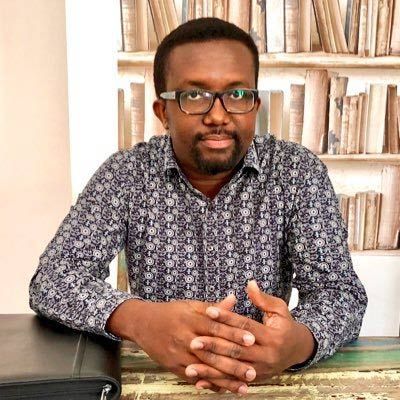Omar Faruk’s career, and the passion that drove it, were the product of his circumstances. He was born in 1976, in the first of strong man Mohamed Siad Barre’s two-decade rule over Somalia, which was characterized by gross rights abuses and barely existent civic space. He came of age in the 90s when those abuses and rights violations were peaking, as his country was engulfed by a ruinous civil war following the collapse of the Siad Barre dictatorship.
“I have graphic memories of injustices that were happening in my country, at first, inflicted by a dictatorial government that reigned for 21 long years, and later, during the civil war that proceeded its collapse. It was during this time that I began my career in journalism. I wanted to humanise the suffering that was going on by telling the stories of the victims, and of the efforts to restore peace in our country,” says Faruk.
Omar Faruk Tweet
When a 27,000-strong United Nations Operation in Somalia (UNISOM) was deployed in the country between 1993 – 1995, Faruk, barely 20 at the time, and only armed with passion and his pen, followed them to the frontline, to tell the story of the peacekeeping mission. Here, among other stories, he told the story of Botswana peacekeepers and how they were valiantly fighting off bandits in Somalia’s Waberi district, securing communities that had been terrorized into surrender. Progressively, his stories inspired Waberi residents to begin cooperating with the peacekeepers to identify and apprehend the bandits, helping restore security to a restive region.
Soon after, the civil war festered into a full-blown terrorist insurgency led by Al-Shabab, and UNISOM was replaced by AMISOM – the African Union Mission in Somalia in 2007. But the media landscape in Somalia did not change. Journalists continued to suffer harassment by both terrorists and state authorities, from physical attacks to arbitrary imprisonment under repressive laws enacted by successive transitional governments, and sometimes death.
In 2002, when Somalia’s then Transitional National Government mooted and approved a repressive media law, Faruk and other journalists came together to form Somali Journalists Network (SOJON), with the primary objective of promoting and protecting press freedom and defending the rights of journalists. The Association would in 2005 rebrand into professional trade union and register as the National Union of Somali Journalists (NUSOJ), to advocate for issues beyond press freedom, including better pay and better working conditions of journalists. In 2009, Faruk was elected Secretary General of NUSOJ. He says he had found his calling in advocacy journalism:
“This approach (advocacy journalism) allowed me to utilize journalism as a powerful tool for inciting necessary and positive change. I realized that I could be both an informer and an effective agent of change. I was able to advocate for the safety and rights of fellow journalists, shedding light on the challenging and often dangerous situations journalists operate in between war theatres, and to advocate for justice of those wrongfully imprisoned, “he says.
Omar Faruk Tweet
His efforts were gaining international attention. In 2010, Faruk was elected President of the Federation of African Journalists by journalists from 43 African countries. At home though, there was little sign that the press freedom environment was changing for the better. In 2017, Global Impunity Index ranked Somalia the most dangerous place to be a journalist in the world, the third consecutive year Somalia was garnering the unenviable distinction. That same year, the Somali Transitional National Government was mooting a new media law in its Parliament, expansive in its scope and intent towards further closing the media space. Faruk got wind of the bill in advance and proceeded to do comprehensive analysis of its repressive intent, which enlisted collective outrage from the public. The Bill was eventually shelved.
Following his talismanic leadership at NUSOJ, Faruk was in 2020 elected the Secretary General of the Federation of Somali Trade Unions (FESTU), the umbrella organisation of all trade unions in the country, which has within its ranks, 11 other trade unions.
“Workers in Somalia face numerous challenges, including denial of their rights to associate, assemble or express themselves freely. Many of them are also poorly paid and have no written employment contracts. Female workers also suffer sexual and gender-based violence, while many workplaces lack sufficient occupational health and safety measures to protect staff. So, I saw my election to lead FESTU as a responsibility bestowed unto me by my fellow workers to lead them in tackling these and other challenges,” he says.
Omar Faruk Tweet
Under his leadership, FESTU set out to mobilise workers to embrace collective bargaining to improve their conditions of work, while providing legal support to workers whose rights have been abused. The trade union also continued to engage the government to pass worker-sensitive labor laws and to domesticate international labor standards and labor conventions that Somalia has ratified.
Last year, Faruk was given another mandate, this time at an even bigger platform. At its 31st Congress held in Muscat, Oman, the International Federation of Journalists (IFJ) elected Faruk to its executive committee, one of only four representatives from Africa. He says the election was an affirmation of his commitment to the cause of press freedom:
“I am deeply committed to promoting press freedom, defending the rights of journalists, and fostering an environment where they can work without fear or intimidation. Being elected by my colleagues to these positions is a show of confidence, which I dare not betray,” he says.
Omar Faruk Tweet

